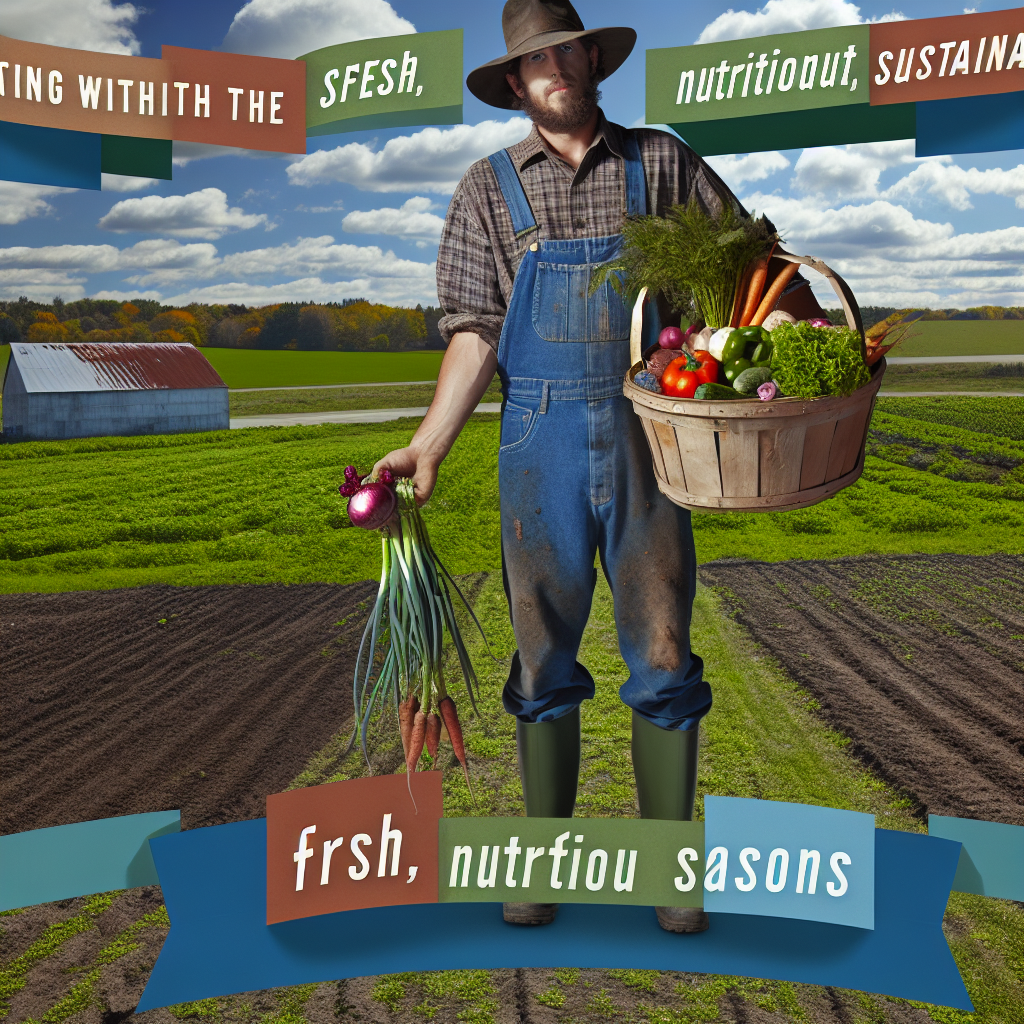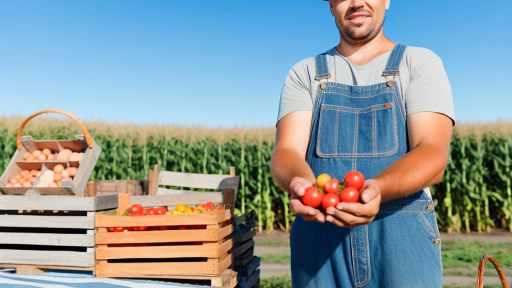Introduction to Seasonal Eating
Seasonal eating refers to consuming foods that are in season within a specific region.
This practice has gained popularity due to its numerous benefits for health and sustainability.
Eating foods in their natural growing season enhances flavor and nutrition.
Moreover, seasonal foods are often fresher and more wholesome.
Additionally, seasonal eating can significantly reduce the carbon footprint.
When produce comes from local sources, transportation emissions decrease.
Supporting local agriculture ensures a stronger community economy.
Local farmers benefit greatly from the demand for seasonal produce.
The community enjoys fresh, flavorful meals while supporting their local farmers.
In essence, seasonal eating promotes environmental sustainability and community wellbeing.
This approach to food aligns closely with sustainable agricultural practices.
Economic Benefits of Seasonal Eating
Increased Revenue for Local Farmers
Seasonal eating significantly boosts revenue for local farmers.
This practice encourages consumers to buy fresh produce directly from farmers.
As a result, farmers experience higher sales during peak seasons.
Moreover, local markets often provide a premium price for seasonal goods.
Transform Your Agribusiness
Unlock your farm's potential with expert advice tailored to your needs. Get actionable steps that drive real results.
Get StartedThis pricing reflects the freshness and quality of locally-sourced products.
Increased demand helps farmers invest in their operations.
They can purchase more seeds, improve their equipment, and expand their farms.
Furthermore, seasonal produce often leads to reduced transportation costs.
Farmers save money since they focus on crops grown in their immediate vicinity.
Consequently, they can pass some of those savings to consumers.
In addition, seasonal eating fosters community connections.
Farmers can establish loyal customer bases within their communities.
These relationships encourage repeat business and word-of-mouth referrals.
Additionally, local food festivals and events promote seasonal products.
Participating in these community initiatives can enhance a farmer’s profile.
Ultimately, seasonal eating benefits not just the farmers but the local economy.
It supports a cycle of sustainability that can enhance community resilience.
In turn, this resilience leads to more stable income for local farmers.
Environmental Impact: Reducing Carbon Footprint by Eating Local
Understanding the Carbon Footprint
Every food choice we make impacts the environment.
The carbon footprint measures the total greenhouse gases emitted during food production.
By choosing local foods, we can significantly reduce these emissions.
Benefits of Local Sourcing
Local sourcing minimizes transportation distances.
Consequently, much less fuel is required to move food to market.
This reduction results in lower carbon emissions.
Moreover, local farmers often use sustainable farming practices.
Seasonal Foods and Their Impact
Eating seasonal foods aligns with nature’s cycle.
These foods typically require less energy to grow and harvest.
Seasonal eating also encourages biodiversity.
Showcase Your Farming Business
Publish your professional farming services profile on our blog for a one-time fee of $200 and reach a dedicated audience of farmers and agribusiness owners.
Publish Your ProfileVariety strengthens local ecosystems, promoting resilience.
Supporting Local Farmers
Buying local supports your community’s economy.
This practice helps farmers thrive in their local markets.
Furthermore, it fosters a deeper connection between consumers and producers.
Knowing where your food comes from promotes transparency and trust.
Personal and Collective Action
Individuals can play a role in reducing the carbon footprint.
Shopping at farmers’ markets is an excellent way to start.
Additionally, community-supported agriculture (CSA) programs emphasize local eating.
These initiatives help make a bigger impact together.
Uncover the Details: Creating a Local Food Sourcing Business Model
Nutritional Advantages: Fresher Produce and Seasonal Nutrients
Benefits of Fresh Produce
Fresh produce offers numerous nutritional benefits.
Seasonal fruits and vegetables tend to be harvested at peak ripeness.
This results in enhanced flavor and higher nutritional content.
Furthermore, fresh produce contains essential vitamins and minerals.
Eating fresh enhances overall health and well-being.
Seasonal Nutrients
Seasonal eating supports nutrient diversity all year round.
Different seasons provide various nutrients beneficial for health.
For example, winter vegetables are rich in Vitamin C.
In contrast, summer crops are often high in antioxidants.
By consuming foods in season, you nourish your body appropriately.
Reducing Chemical Inputs
Locally produced seasonal foods often require fewer chemicals.
This contributes to healthier food options and ecosystems.
Local farmers use fewer pesticides and fertilizers.
As a result, consumers receive cleaner produce.
Supporting Local Agriculture
Choosing seasonal foods benefits local farmers directly.
This practice fosters stronger community relationships.
Additionally, it stimulates the local economy.
When you buy local, you support sustainable farming practices.
As a result, seasonal eating plays a significant role in preserving agricultural land.
Discover More: How Farmers Can Embrace Local Food Sourcing
Community Engagement
Building Connections
Seasonal eating creates strong ties between consumers and local farmers.
This connection fosters community pride and support for local initiatives.
Additionally, it encourages residents to visit farmer’s markets and local farms.
People become more aware of the nutritional benefits of fresh, seasonal produce.
Supporting Local Economies
Purchasing from local farmers boosts regional economies.
Local businesses thrive as residents choose seasonal options.
This choice keeps money circulating within the community.
As a result, farmers can invest back into their operations.
Participating in Collaborative Events
Community supported agriculture (CSA) programs enhance engagement.
Members receive fresh food while supporting farmers directly.
Showcase Your Farming Business
Publish your professional farming services profile on our blog for a one-time fee of $200 and reach a dedicated audience of farmers and agribusiness owners.
Publish Your ProfileAdditionally, these programs often host events such as farm tours and potlucks.
Such activities strengthen relationships among participants.
Educational Opportunities
Local farmers can offer workshops on seasonal cooking and gardening.
These educational experiences empower community members.
They learn the importance of sustainable practices and food sourcing.
Furthermore, these events can inspire healthier eating habits.
Encouraging Sustainable Practices
Seasonal eating inherently promotes sustainability.
It reduces reliance on long-distance transportation of food.
Consequently, this practice contributes to lower carbon emissions.
Local farmers can adopt eco-friendly methods that benefit everyone.
Engaging with Local Governments
Community engagement can lead to supportive policies from local leaders.
Governments may invest in infrastructure for farmer’s markets.
Additionally, they can facilitate zoning laws that support local farming.
Such initiatives create a more conducive environment for farmers.
You Might Also Like: Implementing Local Food Sourcing in Your Farming Plan

Supporting Biodiversity: Encouraging Diverse Crop Production
The Importance of Biodiversity
Biodiversity is crucial for a healthy ecosystem.
It helps maintain soil health and resilience.
Diverse crops can improve pest and disease resistance.
Additionally, they support various wildlife species.
Benefits of Seasonal Eating
Seasonal eating promotes a variety of crops.
Variety prevents the domination of a few species.
This practice enhances biodiversity on farms.
Moreover, it contributes to soil nutrient diversity.
Encouraging Local Crop Production
Local farmers can thrive through diverse crop choices.
They can adapt their planting to seasonal conditions.
This strategy reduces reliance on imported goods.
Also, it fosters a connection between farmers and their communities.
Community Engagement and Awareness
Educating consumers about local varieties is vital.
Farmers’ markets encourage the sale of diverse crops.
Community-supported agriculture (CSA) programs promote seasonal eating.
Such engagement strengthens local economies.
Maximizing Nutritional Benefits
Diverse crops provide a range of nutrients.
Eating a variety of fruits and vegetables enhances health.
Seasonal foods are often fresher and tastier.
They also contain more nutrients compared to imported options.
Encouraging Crop Rotation
Seasons dictate effective crop rotation practices.
Crop rotation boosts soil fertility over time.
It can prevent soil erosion and degradation.
Farmers benefit from reduced pest populations.
Long-Term Sustainability
Diverse crop production aligns with sustainable farming practices.
Showcase Your Farming Business
Publish your professional farming services profile on our blog for a one-time fee of $200 and reach a dedicated audience of farmers and agribusiness owners.
Publish Your ProfileIt offers solutions to issues like climate change.
Moreover, it creates resilience against environmental challenges.
In the long run, this approach protects local ecosystems.
Find Out More: Farm Fresh: How Small Farms Are Building Stronger Local Communities
Challenges for Farmers in Seasonal Eating
Weather Variability
Weather plays an unpredictable role in farming.
Farmers face challenges like droughts and floods.
These extremes can stunt crop growth significantly.
Additionally, changing weather patterns affect planting schedules.
Early frosts or late springs can decimate harvests.
Crop Variability
Crops yield differently each season.
Some years, certain varieties do not thrive.
This variability can lead to uneven income for farmers.
Moreover, farmers must adapt to consumer preferences.
Keeping up with market trends adds pressure on production.
Financial Risks
Seasonal variability presents financial uncertainties.
Farmers may struggle to get loans due to unpredictable returns.
Inconsistent harvests can lead to cash flow issues.
Additionally, investing in diverse crops increases costs.
Resource Management
Farmers must manage resources carefully throughout the seasons.
Irrigation systems may need adjustments based on weather patterns.
They must also consider soil health and nutrient management.
To survive, farmers often adopt new technologies.
However, these innovations require time and investment.
Future of Seasonal Eating for Sustainable Agriculture and Local Economies
Supporting Local Farmers
Seasonal eating significantly boosts local farmers’ sales.
It fosters direct relationships between consumers and producers.
Farmers’ markets thrive through seasonal offerings.
Moreover, local produce encourages community support for agriculture.
This, in turn, strengthens local economies.
Benefits for Sustainability
Seasonal eating promotes sustainable agricultural practices.
It reduces the carbon footprint associated with transportation.
Additionally, it decreases reliance on chemical preservatives.
Focusing on local crops enhances biodiversity.
Ultimately, this approach fosters soil and ecosystem health.
Changing Consumer Behavior
The rise of seasonal eating influences consumer habits.
Consumers increasingly prioritize fresh, local ingredients.
This shift drives demand for locally sourced products.
Consequently, it encourages farmers to diversify their crops.
Furthermore, educational initiatives promote sustainable eating habits.
Fostering Community Engagement
Seasonal eating cultivates a sense of community.
Community-supported agriculture programs thrive on local engagement.
Showcase Your Farming Business
Publish your professional farming services profile on our blog for a one-time fee of $200 and reach a dedicated audience of farmers and agribusiness owners.
Publish Your ProfilePeople participate in farm events and harvest festivals.
These activities strengthen connections among local residents.
In addition, this shared experience promotes healthy eating habits.
Looking Ahead
The future of seasonal eating appears promising.
Trends indicate a growing consumer awareness of food origins.
As more people embrace this lifestyle, support for local farmers increases.
This shift results in enhanced sustainability within agriculture.
Ultimately, seasonal eating can lead to robust local economies.




